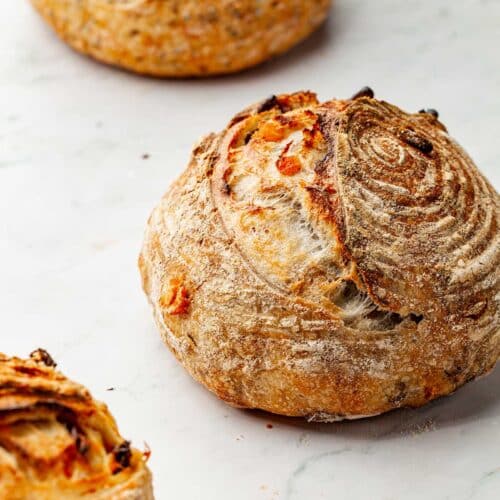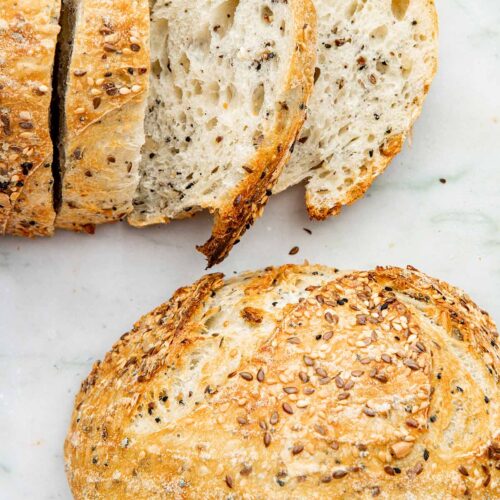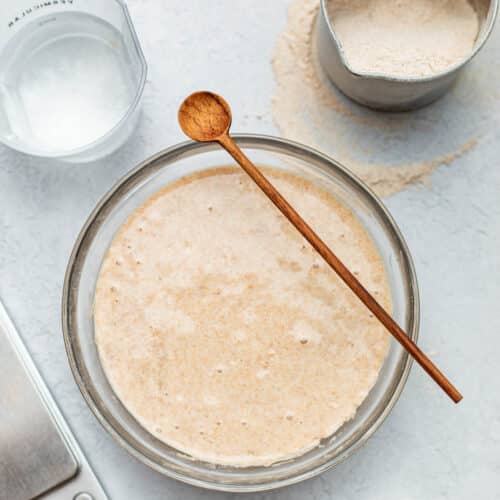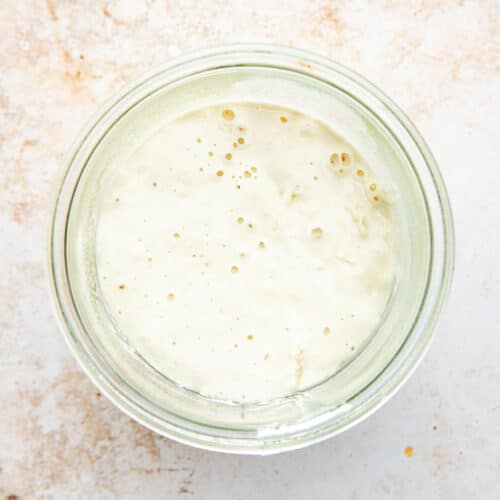Everything you need to make sourdough bread, all wrapped up in one place. You may already have everything you need to make a good loaf! If you're just getting started it can be daunting. If you're already hooked you know how important the right bread-making tools can be.
Whether you're curious about trying to bake sourdough, an eager newbie, or a seasoned baker, we're sharing our favourite sourdough tools to help you make a great loaf. Keep reading to find out more.
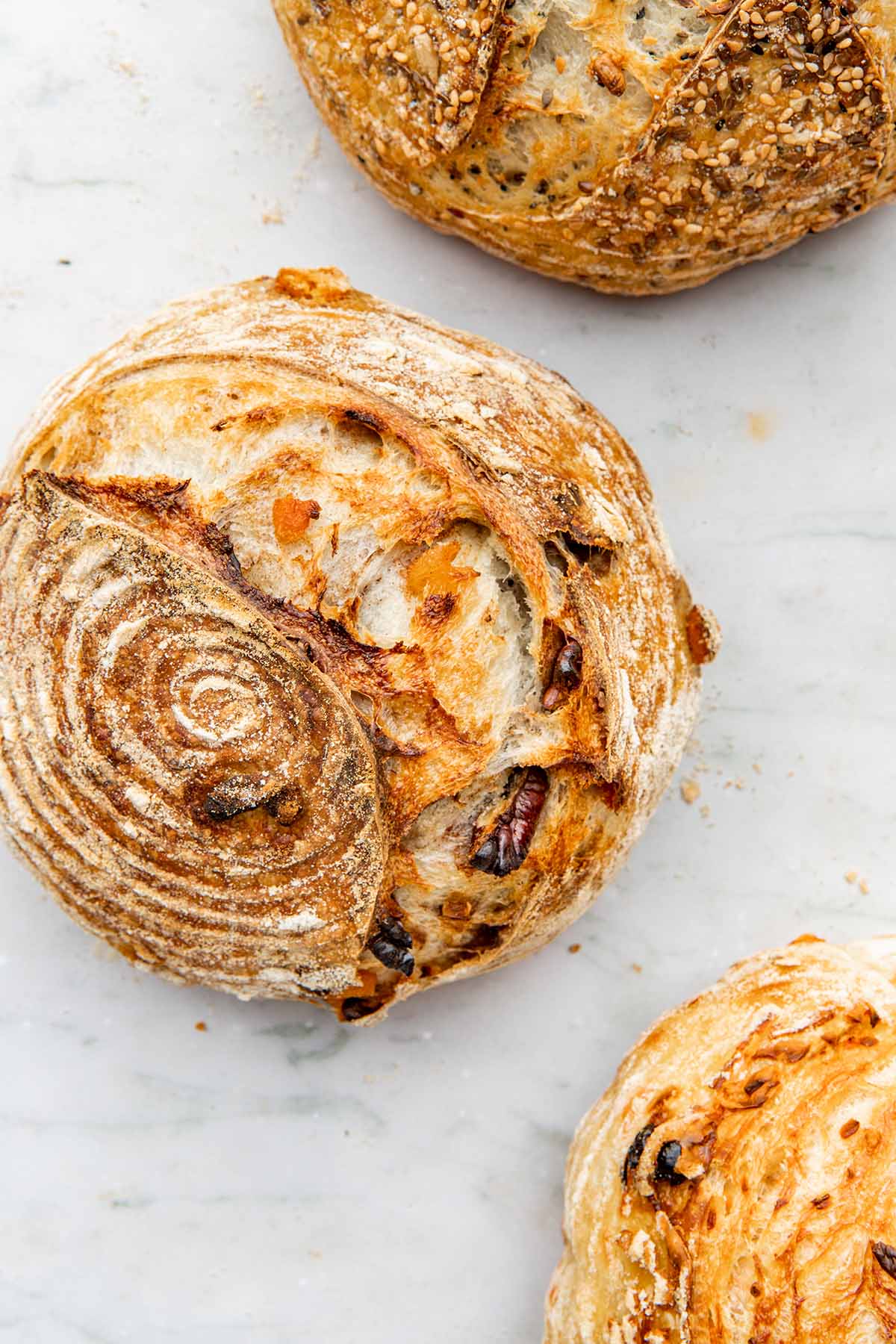
Essential Sourdough Tools
If you're just starting out you can look for these items at second-hand thrift stores, online market places, garage sales, or even borrow items from family or friends.
Sourdough Starter
This is most important of the sourdough tools since you can't bake sourdough bread without it. We have a post to guide you called How To Make Sourdough Starter From Scratch, but keep in mind it can take up to three weeks to get a good starter going.
Other options if you don't want to wait are to buy dehydrated starter online or from a natural food store. You can also check online for local bread forums in which someone may be willing to share some of their starter with you.

Clockwise from top left to right.
Flour
Get the best quality flour you can afford, whether it be unbleached white flour from your local grocery store or a stone milled sprouted wheat boutique flour. Like all things you bake, your end product will only be as good as your ingredients, so look for flours that don't have any additives.
Most recipes will call for bread flour or strong flour. Some grocery stores will carry this, and most plain white flour in North America has a high enough gluten content to make a good sourdough in any case.
If you're in Europe, the flour is naturally lower in gluten (any wheat that's grown in Europe and the UK, that is) so you might want to look for bread flour.
Mixing Bowls
Having a variety of mixing bowl sizes is useful for measuring ingredients ahead of time, and for mixing dough. We love glass mixing bowls because you can see the fermentation of your sourdough taking place and there's no risk of the material impacting the process.
That being said, most large mixing bowls will do. Stainless steel, ceramic, and glass are all ideal for mixing and fermenting your dough in.
Kitchen Scale
A digital kitchen scale is essential to ensure accurate measurements. If you don't own a scale already, we recommend buying new, however, digital scales can be found online for $20 or less. Older analogue scales will also work, they just wont be as precise.
Grocery stores quite often sell digital scales with their baking supplies as well, so you can pick one up at the same time as flour. Check the batteries – many use round batteries, which are more expensive, but plenty use AA too.
Dutch Oven
A cast iron Dutch oven or bread cloche will most likely be your biggest sourdough purchase. While a cloche is easier to use, Dutch ovens are more versatile and can be used for every day general cooking.
You can often find them at local thrift shops for a decent price. Make sure the pot isn't too damaged, and is nice and heavy (preferably cast iron) so it can withstand the high heat of the oven. Other baking alternatives include a different method and a pizza stone, or a Romertopf clay pot which can easily be found second hand.
Cotton or Linen Tea Towels
Having cotton dish towels on hand is helpful when making sourdough. They can be used to cover your dough as it proofs, handling hot items, lining banneton baskets, or wrapping baked loaves.
They have to be 100% natural fibre, as any plastic fibres (polyester, nylon, etc.) will stick to your loaf and cause problems.
Bannetons
Bannetons are the wicker proofing baskets shaped sourdough loaves ferment in. They come in a variety of shapes and sizes and give sourdough bread its distinct ribbed-patterned crust. We recommend either a round banneton or an oval banneton (if choosing an oval banneton, be sure you have a baking pot large enough to fit your loaf).
Other options are an 8 to 10-inch (20 to 25-cm) diameter mixing bowl lined with a floured tea towel, or any other small basket of the same size.
Parchment Paper
Parchment paper can be found at almost any grocery or kitchen supply store. If you buy a natural type, it can be added to the compost pile or naturals bin along with your discard (it should specify on the package).
Lame or Razor Blade
Scoring bread with a sharp knife can sometimes work, however, a sourdough lame (pronounced "lahm"), or plain razor blade (found at most pharmacies) will create a much sharper and smoother score on your loaf.
Oven Thermometer
Not pictured. An oven thermometer is the best way to know if your oven has preheated to the correct temperature for the recipes you make. You may be surprised as many home ovens can be off anywhere between 5 and 30ºF. Oven thermometers are inexpensive and worth every penny.

Clockwise from top left to right.
Extra Tools That Come In Handy
Oven Mitts
Not pictured. Sourdough is generally baked at 450ºF (230ºC) or higher, so needless to say your Dutch oven will get very hot. Ensure you have thick cotton tea towels (no nylon!) or good oven mitts to handle the pot without burning yourself.
Bowl Covers
Bowl covers can create an airtight cover for your dough as it rests. While there are many cute options out there, a good reusable and inexpensive alternative can be found with a simple shower cap! Dollar stores also sometimes have plastic shower cap-style bowl covers.
Bench Scraper
Bench scrapers can help shape your loaves and clean your work surface. We prefer stiff metal bench scrapers as opposed to flexible plastic options. Most kitchen stores carry a variety of options.
Bread Knife
Crusty bread is hard to slice and deserves a great bread knife. A serrated knife is a must for even slices.
Thermometer
Thermometers are good if you want to check the internal temperature of your bread after baking. They especially come in handy if baking very wet loaves like rye or gluten-free sourdough.
Water Filters
Water filters are helpful if you live in an area with a lot of chlorine or additives in the water. Some of these additives can prevent fermentation and/or slow down dough development. Other options are to buy bottles of distilled water, or simply leave your tap water on the counter overnight to let these additives evaporate.
Rice Flour
You can use any flour you want to dust the inside of a banneton basket or bowl before placing a loaf in to proof. That being said, we also really like a good dusting of rice flour to prevent sticking.
If you make found this Recommend Sourdough Tools Tutorial any other sourdough bread tutorials on the Baked Collective helpful, please take a moment to leave a comment below. It’s such a help to other readers. For more baking, follow along on Instagram, TikTok, and YouTube.

